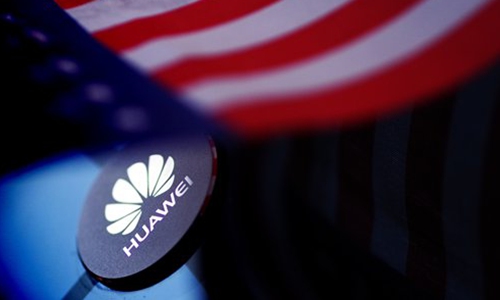
Photo: IC
Telefonica Germany, one of Germany's three major telecom carriers, decided on Wednesday to use Nokia and Huawei equipment to build 5G network, putting the US warning aside. The company said its cooperation with Huawei was pending approval from the German government. The German government has said that it would not exclude any company from 5G network rollout, stressing that it will verify the security of all companies participating in Germany's 5G network construction.
Washington has done all it can to block Huawei equipment from entering European countries' 5G networks, even threatening to stop sharing intelligence with allies that reject the warning. The US has strong control over Europe in terms of security, but it fails to get those allies to cooperate on Huawei. Its credibility will suffer, something Washington clearly did not expect.
The root cause is that the Americans are too overbearing and unreasonable this time, seriously violating the vital interests of European countries.
Washington seriously exaggerated the security risks of using Huawei equipment, and placed some groundless charges on Huawei. Europeans can tell that Washington's crackdown on Huawei is driven by concerns that the company's rise could pose a challenge to US technological hegemony, and that the US will not accept a Chinese company that is riding high in 5G technology, not that Huawei's equipment really poses an insurmountable security risk.
More importantly, Huawei is absolutely ahead in 5G network technology. Now to build an efficient and cheap 5G network, it is impossible to bypass Huawei. America's geopolitical mind-set decides that in order to kill Huawei, it would rather slow down 5G. However, European countries have different interests in this respect from the US. They do not want to delay the construction of 5G networks. Giving up Huawei equipment means that their 5G networks are inefficient, slow and expensive.
The transatlantic relationship between the US and Europe, in which the US protects Europe in security and looks after Europe in economic terms, is shifting. The US has become more selfish. Europe's geopolitical perception of Huawei's rise is different from that of the US, and an extra Huawei option would undoubtedly do more good than harm to Europe.
Washington's pressure on Europe not to use Huawei's equipment breaks the rules, dictating to the latter on matters that are entirely within European sovereignty. In particular, the US ambassador to Germany has hurt the feelings of the German public by bossing around, which have touched German sovereignty and national dignity. Some Europeans will naturally think that if this time they listen to the US, what should they do in the future?
As long as one European telecommunications carrier uses Huawei equipment to build 5G network, its technological achievements will be clearly displayed there, with a wider demonstration effect. Because European and US telecommunication manufacturers have almost no chance to immediately catch up with Huawei in technology, this makes the US' blocking of Huawei face constant market pressure.
The campaign to kill Huawei has fully exposed US' moral flaws. If it goes ahead, it will suffer further political losses. America's 5G network will also lag behind other developed regions in the world in some important technical indicators. Allies will not be willing to accompany its paranoia and backwardness, such reluctance will be manifested in various ways.
The article is an editorial of the Global Times. opinion@globaltimes.com.cn
